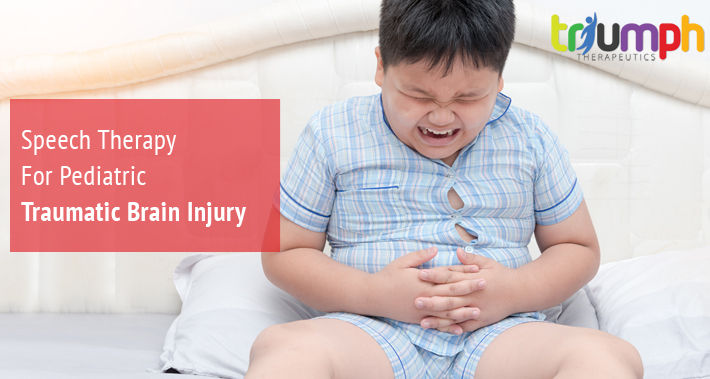Speech Therapy For Pediatric Traumatic Brain Injury
https://www.triumphtherapeutics.com/wp-content/uploads/2022/02/Triumph-Therapeutics-Speech-Therapy-OT-Physical-Therapist-Washington-DC-Feb02-01-2022.jpg 710 379 Triumph Therapeutics Triumph Therapeutics https://www.triumphtherapeutics.com/wp-content/uploads/2022/02/Triumph-Therapeutics-Speech-Therapy-OT-Physical-Therapist-Washington-DC-Feb02-01-2022.jpgAs a parent or caregiver, it can be very scary if your child suffers any injury, but especially if that injury could impact their brain.
You worry if the injury will cause long term effects, and how it will impact their life going forward.
Questions may come up over how potential brain damage will affect them, both socially and academically.
At Triumph Therapeutics, we offer Washington DC pediatric speech therapy treatments, and we’re here to help you navigate your child’s options, as they recover from traumatic brain injury.
Keep reading to learn more.
What Is Traumatic Brain Injury?
Traumatic brain injuries occur as the result of a head injury which impacts brain function.
Some common causes of traumatic brain injury include:
- Sports injuries
- Falls
- Car crashes
- Violence
These injuries are classified as mild, moderate, or severe based on factors such as how long the individual loses consciousness and brain scan results.
Different Types Of Traumatic Brain Injury
There are different types of traumatic brain injury, based on the cause of the injury.
These can include:
Concussion
Also called a mild traumatic brain injury, these are the most common type of brain injury, generally caused by a blow to the head.
Coup Contrecoup Injury
This occurs when the brain or skull is forced to the side opposite the impact, such as in a car accident or from a blow to the head.
Shaken Baby Syndrome
Often due to frustration if a baby will not stop crying, and considered child abuse, shaken baby syndrome can result in brain bleeds, stroke, and tears in the brain stem.
Penetrating injury
Occurs when an object penetrates the skull and brain.
Objects which penetrate the brain can often cause more damage when removed, so immediate medical attention is important to ensure any penetrating items are removed safely.
What Are The Symptoms Of Traumatic Brain Injury?
Traumatic brain injury will present through physical, sensory, and cognitive symptoms.
Next, we’ll have a look at signs and symptoms associated with each of these three areas.
Physical Symptoms Of Traumatic Brain Injury
Physical signs and symptoms are those which affect the body.
For traumatic brain injury these can include:
- Vomiting and nausea
- Seizures
- Pain
- Decreased level of consciousness
- Issues with bladder and bowel functions
- Headaches and dizziness
- Tiredness
- Loss of coordination and balance
- Issues with motor skills
- Decreased strength
Sensory Symptoms Of Traumatic Brain Injury
Sensory symptoms affect your senses – the way you see, feel, hear, smell, and taste things.
With a traumatic brain injury, you may notice symptoms in all of these areas, with most of them being related to the eyes and ears.
Visual symptoms can include:
- Light sensitivity
- Issues with perception of color, size, distance, and depth
- Changes in ability to focus
- Deficits in the visual field
Issues related to the ear can be auditory, as well as vestibular, meaning they affect the inner ear, and can include:
- Hearing loss
- Tinnitus (ringing in the ears)
- Trouble hearing speech in a noisy environment
- Vertigo and issues with balance
- Sensitivity to sound
- Changes to how you process sounds
Additionally, sensory symptoms can include loss of taste and smell, as well as tactile issues including changes to how you perceive pain and temperature.
It’s worth noting these symptoms are similar to those of sensory processing disorder.
Cognitive Symptoms Of Traumatic Brain Injury
Cognition involves thought processes and mental activity.
Symptoms relating to this may include issues related to a number of different areas.
Executive functioning issues may look like:
- Poor judgment
- Inability to plan and organize
- Issues with problem solving
- Inflexibility, inability to adjust when plans or routines change
- Trouble making decisions
Attention issues could present in the following ways:
- Selective attention
- Inability to shift from task to task
- Lower attention span
- Unable to maintain attention on a task long enough to finish it
Other signs of cognitive issues related to brain injury could include:
- Lower processing speed, leading to confusion (for instance being unable to follow along if someone is speaking quickly)
- Short term memory issues which make learning new things difficult
- Issues with working memory and following directions
- Trouble with information retrieval
- Spatial issues
How Does Traumatic Brain Injury Affect Speech And Language?
Traumatic brain injury can have impacts on your ability to communicate, as they often have impacts on speech and language abilities.
Individuals who have suffered a brain injury often have difficulty conversing with others and functioning in conversation, in terms of being able to take turns and maintain topics.
They often go off on tangents and have trouble reading non verbal cues.
Other language issues can include:
- Trouble retrieving words
- Inability to speak fluently
- Inability to comprehend abstract concepts
- Being unable to plan, organize, write, and edit documents
Speech issues may include:
- Inability to create sounds and form words
- Speaking without variations in tone
- Nasal sounding speech
- Slurred speech
Traumatic brain injury can also cause apraxia, so speech therapy for childhood apraxia of speech and for traumatic brain injury is often closely related.
How Can Speech Therapy For Pediatric Traumatic Brain Injury Help?
Although a speech therapist can’t diagnose traumatic brain injury, they can play an important role in screening, assessment, and treatment.
Some of the ways a speech therapist can help include:
- Providing assessments and screening for side effects of traumatic brain injury, including hearing and speech impairment
- Building treatment plans designed to help with speech, language and communication
- Referring to other specialists where required, including to a Washington occupational therapist or Washington physical therapist
- Help educate families of children affected by brain injuries in ways to help promote healing
- Act as an advocate for people with a traumatic brain injury, when it comes to needing accommodations, such as in a school setting
Treatment approaches will vary, depending on the specific details of the brain injury, and will often combine aspects of multiple approaches.
Book Your Appointment With Triumph Therapeutics Today
Has your child experienced a traumatic brain injury?
Are you wanting to get them the best treatment possible, to help restore their speech and language capabilities?
We’re Triumph Therapeutics, and we offer pediatric speech language therapy in the Washington DC area.
Contact our office today for more information on our services, or to set up a consultation.


